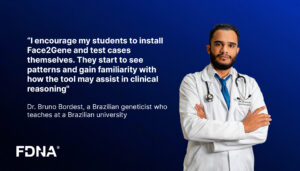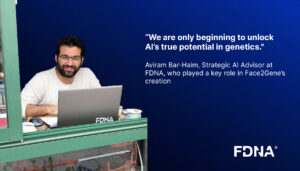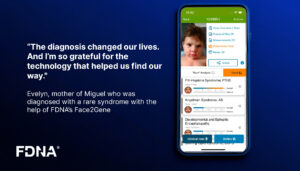Nov 1, 2016
Planet Biometrics – “Health startup FDNA plans to identify genetic syndromes using facial recognition software.FDNA has developed a technology that allows this process to be automated and combined with phenotypic and genetic information. The firm integrates facial analyses with other phenotypic traits and variants from genetic tests, such as exome and genome sequencing, reports GenomeWeb.”Over the past year, it became more apparent that phenotyping is essential for that process – genotyping and phenotyping really walk hand in hand and are part of the same solution,” Dekel Gelbman, FDNA’s CEO, told GenomeWeb. “What we aspire to be is the leading phenotyping technology for this industry. And I think that through our collaborations, not only with clinicians but with all the diagnostic labs we’ve recently started collaborating with, we’re poised to be that technology in the very near future.”Using the Clinic app, doctors can upload a facial photograph of their patients. The FDNA software then analyses the photo and extracts a set of de-identified biomarkers, which it compares to a database of patients with confirmed genetic diagnoses. Based on facial similarity, it then generates a list of possible syndromes and associated phenotypic traits. Doctors can use this information to further evaluate their patient, while laboratories, through the Labs app, can use it to filter and prioritize variants from genetic tests.”
The article describes how FDNA is revolutionizing the diagnosis of genetic disorders through its innovative Face2Gene technology, which utilizes facial recognition software. This approach integrates phenotypic data with genetic information, enabling healthcare professionals to identify potential genetic syndromes more effectively. By allowing clinicians to upload patient photographs, Face2Gene analyzes facial features and generates a list of possible diagnoses, enhancing diagnostic accuracy and patient care. FDNA’s commitment to improving genetic evaluations marks a significant advancement in the field of medical genetics.


